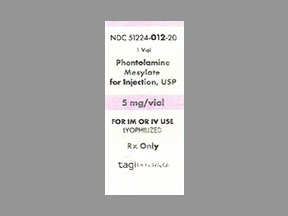
Phentolamine Coupons & Savings Card – Discount Prices from $98.18
Phentolamine is a medication that blocks alpha-adrenergic receptors, leading to the relaxation of blood vessels and a subsequent decrease in blood pressure. It is commonly used to manage hypertensive episodes associated with pheochromocytoma, a rare tumor that causes excessive release of catecholamines. Additionally, phentolamine is employed to prevent tissue damage following the accidental leakage of certain vasoconstrictive drugs into surrounding tissues. In dental procedures, it helps reverse the effects of local anesthesia, reducing the duration of numbness in soft tissues. The medication is typically administered via injection, either intramuscularly or intravenously, and acts rapidly with a short duration of effect. Common side effects may include low blood pressure, rapid heart rate, and gastrointestinal discomfort. Due to its cardiovascular effects, phentolamine is contraindicated in individuals with certain heart conditions, such as myocardial infarction or angina. Therefore, it should be used under the supervision of a healthcare professional.
Our coupons are free to use. Before paying, show the pharmacist your Phentolamine savings card to get your free discount. Use our filters below to edit the prescription box to match your needs. The Phentolamine prices will update based on your prescription needs. Above our Phentolamine coupons, you can change your location to see pharmacy prices and costs in other areas. We're here to help you buy Phentolamine at the lowest price with our prescription discount card.
My prescription
Edit
5MG, Phentolamine (1 Solution Reconstituted)
Select pharmacy

CVS
$315.63
COUPON PRICE
Albertsons
$98.18
COUPON PRICE
Walgreens
$307.17
COUPON PRICE
Walmart
$398.02
COUPON PRICEPhentolamine savings card
Show this card to your pharmacist
Albertsons
$98.18
BIN
ID
PCN
GRP
019876
LH10621C64
CHIPPO
LHX
Powered by
Phentolamine is a medication that blocks alpha-adrenergic receptors, leading to the relaxation of blood vessels and a subsequent decrease in blood pressure. It is commonly used to manage hypertensive episodes associated with pheochromocytoma, a rare tumor that causes excessive release of catecholamines. Additionally, phentolamine is employed to prevent tissue damage following the accidental leakage of certain vasoconstrictive drugs into surrounding tissues. In dental procedures, it helps reverse the effects of local anesthesia, reducing the duration of numbness in soft tissues. The medication is typically administered via injection, either intramuscularly or intravenously, and acts rapidly with a short duration of effect. Common side effects may include low blood pressure, rapid heart rate, and gastrointestinal discomfort. Due to its cardiovascular effects, phentolamine is contraindicated in individuals with certain heart conditions, such as myocardial infarction or angina. Therefore, it should be used under the supervision of a healthcare professional.
Our coupons are free to use. Before paying, show the pharmacist your Phentolamine savings card to get your free discount. Use our filters below to edit the prescription box to match your needs. The Phentolamine prices will update based on your prescription needs. Above our Phentolamine coupons, you can change your location to see pharmacy prices and costs in other areas. We're here to help you buy Phentolamine at the lowest price with our prescription discount card.
Phentolamine dosage forms
Use our Phentolamine 5MG coupon with prices from $98.18 for 1 Solution Reconstituted. You can also use our Phentolamine 5MG coupon with prices from $914.27 for 10 Solution Reconstituteds.
Dosage Quantity Price from Per unit 5MG 1 Solution Reconstituted $98.18 $98.18 5MG 10 Solution Reconstituteds $914.27 $91.43
| Dosage | Quantity | Price from | Per unit |
|---|---|---|---|
| 5MG | 1 Solution Reconstituted | $98.18 | $98.18 |
| 5MG | 10 Solution Reconstituteds | $914.27 | $91.43 |
